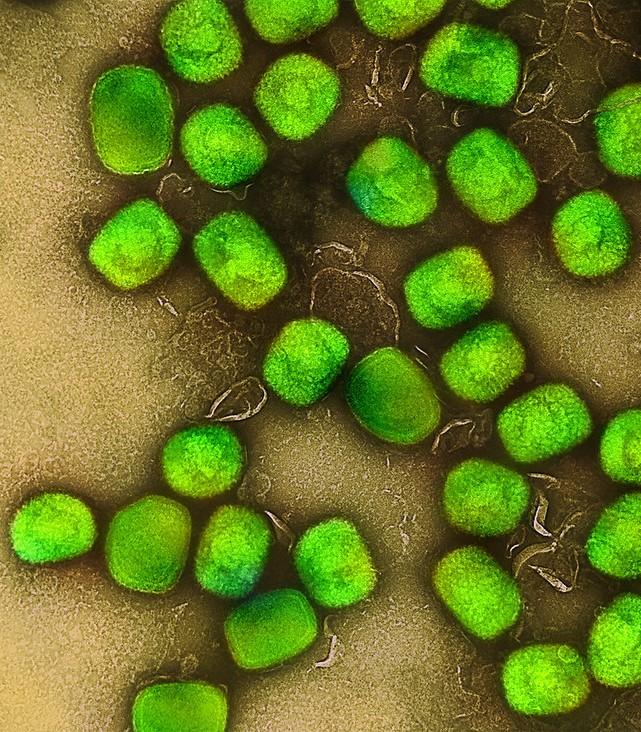Chicago, Atlanta, Los Angeles, Philadelphia, and New York City now have initial or additional monkeypox cases, suggesting the poxvirus is spreading in the United States, and experts discuss how to communicate risks without stigmatizing sexual minority groups.
New cases in several cities
New York City officials said today they have identified a fifth presumptive case of monkeypox in a person who tested positive for orthopoxvirus. In Chicago, a man was isolating at home while waiting for confirmatory test results from the Centers for Disease Control and Prevention (CDC).
Los Angeles County officials have also identified a case in an adult resident.
"The patient … recently traveled and had a known close contact to a case. Although the patient is symptomatic, they are doing well and not hospitalized. They are isolated from others," the county said in a press statement.
16 of 17 initial US cases in MSM
There are now 21 confirmed monkeypox cases in the United States. Today in Morbidity and Mortality Weekly Report (MMWR), the CDC offered details of the first cases.
The MMWR report tracks the first 17 cases found in nine states through May 31. Sixteen of the 17 cases were in men who have sex with men (MSM). Fourteen of the 17 reported recent international travel. All but one patient developed a rash across the body, with 8 patients reporting the rash beginning in the genital area.
Of note, the first two men (one in New York City and one in Massachusetts) with monkeypox in the country described symptom onset on May 4 after recent international travel. It was only after May 17, when growing media coverage of monkeypox cases in the United Kingdom, that the men were tested for poxviruses.
"Right now, the overwhelming majority of cases have recent travel history before symptoms," said Capt. Jennifer McQuiston, DVM, a CDC deputy director in the Division of High-Consequence Pathogens and Pathology, during a press conference on the report.
Though many of the cases are described as mild, with patients isolating at home, McQuiston said she did not want to minimize the illness.
"It can be really painful and cause long-term scarring," she said. "Some patients have needed painkillers."
Expert underscores clear messaging
The CDC recommended that all patients isolate until their rashes have healed, with new skin emerging after scabs fall off. Skin-to-skin contact with the monkeypox rash can transmit the virus.
"CDC urges health care providers in the United States to be alert for patients who have rash illnesses consistent with monkeypox, regardless of a patient's gender or sexual orientation or a history of international travel or specific risk factors for monkeypox. Clinicians should contact their local or state health department if they suspect a case of monkeypox," the report said.
New Jersey–based risk communication expert Peter Sandman, PhD, said agencies such as the CDC and the European Centre for Disease Prevention and Control (ECDC) are working to counter stigmatizing MSM in their messages on monkeypox, but in doing so may be doing a disservice to communities most at risk for catching the virus.
Yesterday the ECDC and the World Health Organization's European office released new risk communication guidance on the virus. Sandman said the guidance makes several good points but is lacking in certain important respects.
"Strangely missing from every list of target audiences in this report: people who have sex with MSM. Bisexual people are one obvious transmission path from the MSM community to everyone else," he told CIDRAP News in an email. "There is nothing here about warning women (other than sex workers) of the risk that a bisexual male sex partner may have monkeypox."
Sandman said the legacy of HIV means most MSM are likelier than many others to seek medical help when they see a new symptom.
"This will prove helpful in efforts to control the spread of the disease," he said.
Sandman calls the advice in the report to avoid stigmatizing language "exactly right." But he add, "My concern is that the rest of this report overstates the risk of exacerbating stigmatization and will reinforce what is already a dangerous tendency in monkeypox risk communication: fear of accusations of stigmatization leading to pussyfooting about what groups are most at risk and what behaviors are riskiest."
"Respectful language—absolutely. Circuitous, vague language—I hope not."
Sandman also objects to officials describing cases as "mild."
"In the effort to keep people calm, I think scary information is being downplayed," he said. The West African clade, which is being implicated in the global outbreak, carries with it a 1% case-fatality rate, and long-term outcomes of monkeypox patients are largely unknown.
Global cases top 1,100
In 1 month, the outbreak has grown to 1,103 cases in at least 30 non-endemic countries, according to the Global.health database. The United Kingdom, Spain, and Portugal continue to report the most cases.
The UK Health Security Agency (UKHSA) said 15 additional cases in England and 3 in Scotland have raised the UK total to 225.
France has confirmed 33 cases, of which 24 are in Paris, and Latvia has reported its first case.






















